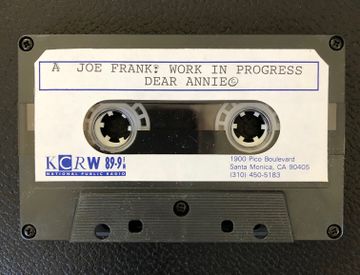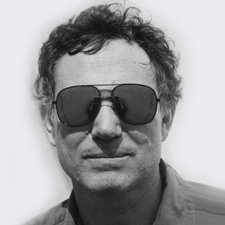Dear Annie
From The Joe Frank Wiki
I tell myself she's too young for me, that that's our problem, the difference of fifteen years between us.
 | |
| Series | |
|---|---|
| Work In Progress | |
| Original Broadcast Date | |
| 1986 | |
| Cast | |
| Joe Frank | |
| Format | |
| Serious Monologue, 55 minutes | |
| Preceded by: | Photography |
| Followed by: | Rain |
Dear Annie is a program Joe Frank produced as part of the series Work In Progress. It was originally broadcast in 1986.
Synopsis
- Monologue: contemplating his younger lover Annie and her childlike habits. Correcting her verbal errors. Wrestling and laughing together. The idea she might outlive him seems impossible and hilarious to her. He presses the issue. Her birthday: he feigns death, an old joke he likes to play.
- Joe writes a farewell letter to Annie. We hear him typing as he composes.
- More on Annie: she uses vast quantities of toilet paper. She's one of those annoying people who cruises in the left lane, a huge pet peeve of Joe's. Arguments and scenarios over seat belts. More arguments. At a club in Malibu on New Years Eve. When she cries, it makes him feel like he wants to be with her forever.
- The breakup letter to Annie again.
- More stories of sad, frustrated Annie. He imagines her suicide.
- On their early arguments over the social issues caused by their age difference.
- The letter to Annie again.
- Annie kissing Joe goodbye at a restaurant. Annie's cycles of rage and apology. Wanting to break up but being unable to--there's always a reason he can't leave her. Remembering he time he almost ran away from home as a youngster. Self-consciousness eating alone at a restaurant. Loneliness. Annie shopping for apartments. All his conflicting emotions about her: love and hate, pride and shame. On the nature of love. "To me, love is inviolable, sacred. This is why I don't feel up to it." Imagining his apartment without her stuff.
- Remembering closeness and physical intimacy with Annie.
- The letter again, fading out as the show closes.
Music
- This program contains no music other than drones
Miscellanea
- The only music of this program consists of a "drone" derived from the stringed instruments heard during the introductory ~26 seconds of "More Colours" by Eberhard Weber (from The Colours Of Chloë, 1974).
- In other programs a drone is produced using a synthesizer/sampler, has a more vocal sound, and is a key feature of many programs.
